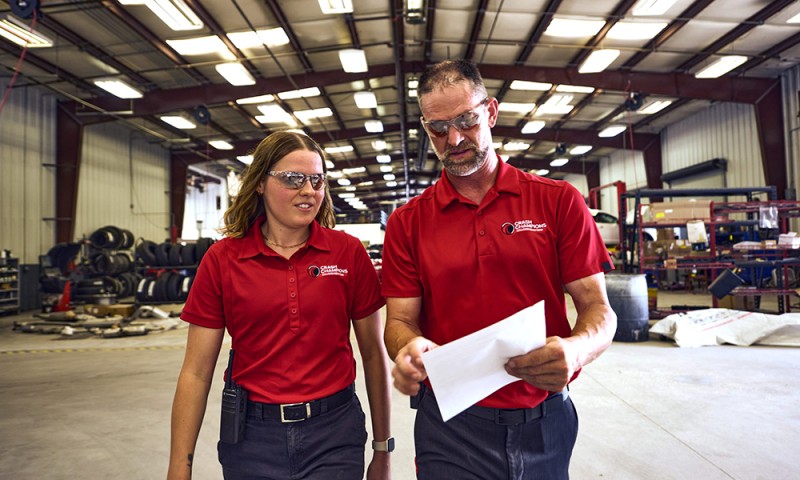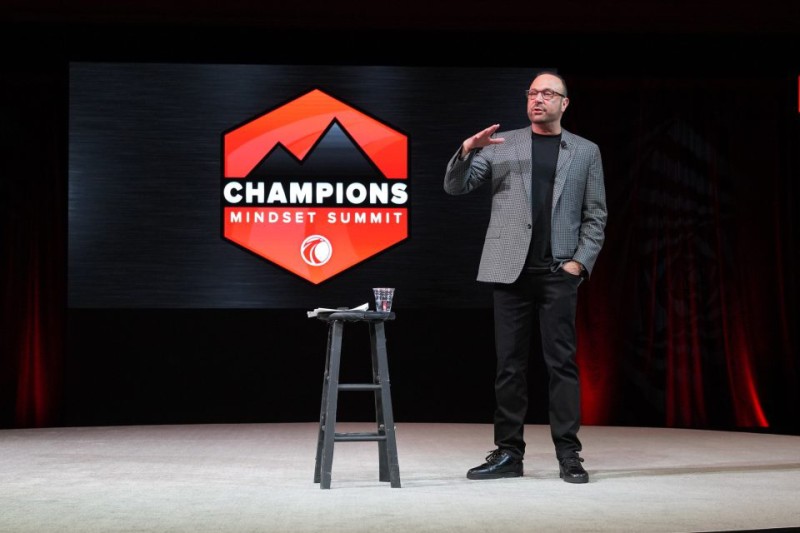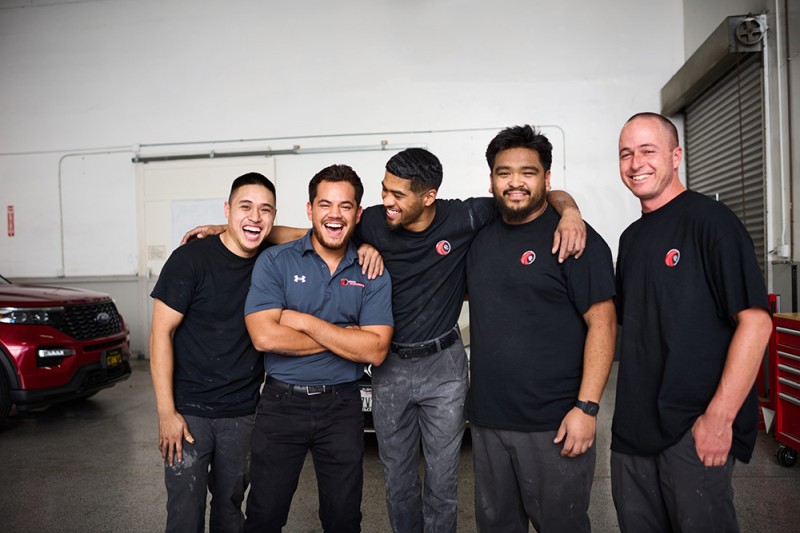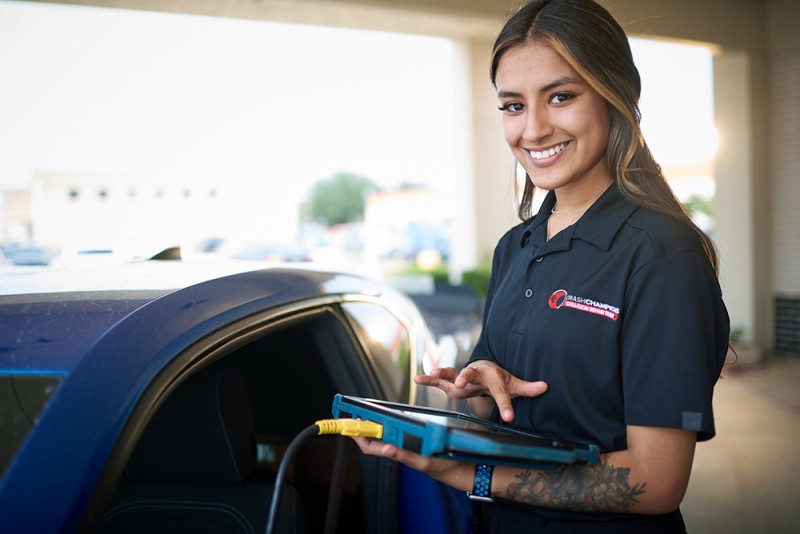
• Crash Champions的创始人兼CEO马特·埃伯特出身平凡,原本并未指望能上大学,但在他少年时期自己动手修好了被撞毁的爱车后,在对汽车的热爱和创业精神的引领下,他投身于事故车维修行业。1999年从一家小店起步,埃伯特将Crash Champions发展成为拥有超过650家门店、年收入27.5亿美元的全美行业巨头,而其大部分员工都没有大学学位。
当马特·埃伯特谈论他的事故车维修店帝国时,他态度谦逊,一如他的创业起点。
Crash Champions去年报告的营收为27.5亿美元,其CEO来自伊利诺伊州的一个小镇,在那里,获得大学学位既非理所当然,也不是人们所期望的。
他对《财富》杂志表示:“我的家境并不宽裕。在我家从未讨论过上大学和宏大的职业规划这种话题。”
埃伯特从小就有创业精神,大约10岁或11岁时就开始帮人修剪草坪。但他真正感兴趣的是汽车,他迫不及待地想打开自己第一辆车的引擎盖,更换机油,并卸下车轮。
他回忆道:“对我来说,有一辆汽车意味着自由。我依然记得第一次独自坐在车里的情景,想着此刻我可以去任何想去的地方。”
但在16岁那年,他撞毁了自己的第一辆车:一辆双座的福特EXP。由于不想报保险理赔或导致保单被取消,他找到当地一位汽车修理工,询问对方能否教他如何修车。那位修理工答应了他的请求,而埃伯特从此开始了汽车维修职业生涯。

没有学位也能年薪六位数
高中毕业后,埃伯特就在那位修理工手下工作,因此可以说他进入这个行业“纯属意外”。如今,他掌管的公司自2019年以来营收增长了130倍、拥有逾万名员工。
和埃伯特一样,公司83%的员工都没有大学学位。
他表示:“我没上过大学,但人生确实过得非常好。我并不反对大学教育。我认为大学确实有诸多优点。但我也知道,并非人人都有机会上大学。”
在雇用没有四年制大学学位的人才方面,埃伯特的公司走在了前列。读大学历来被视为通往高薪职业的唯一途径,但年轻一代开始意识到,这并非成功的唯一途径。许多Z世代正投身技术工种,且无需背负学生贷款的沉重负担。此外,有些人从事这类工作也能获得六位数以上的年薪。
埃伯特表示,在Crash Champions,技术人员的年薪超过10万美元。2025年第一季度,美国人口普查局(U.S. Census Bureau)的报告显示,全国1.209亿全职工薪人员的周薪中位数为1,194美元,折合年薪约62,000美元。这意味着Crash Champions员工的收入约为美国平均工薪水平的1.6倍。
埃伯特表示:“我们将大学教育视为一种加分项,而非必需条件。”当然,他也补充道,某些特定职位需要特定学位,比如他们的财务总监和首席法务官就需要相关学位。
尽管大多数岗位不要求大学学位,Crash Champions仍非常注重员工的持续学习。公司设立了领导力发展项目,专注于文化和人才保留、财务与运营领导力、战略领导力、沟通与认可、持续学习,以及授权技巧和团队建设等主题。已有数千名员工参与了这些项目。

埃伯特表示:“我们能招募到最优秀的技术工人,也能培训出最优秀的技术工人,[但]如果他们在糟糕的管理者手下工作,他们就会离开,另谋高就。”
他表示,Crash Champions 还提供学徒计划,能够“从零开始培养技术工人”。学徒会被安排跟随一位团队成员工作几年,然后就能独立作业了。
Crash Champions 的成长故事
埃伯特将公司的诸多成就归功于他的员工。
他表示:“我成功的一个关键就是,将那些比我更优秀、更聪明、有不同经历的人聚拢在我身边。”
尽管如此,埃伯特仍是公司背后的策划者。高中毕业后,他搬到芝加哥郊区,和祖父母一起生活了几年,并在一个车身修理厂找到工作。那时,他仍想自己创业,但“作为一个谁也不认识的毛头小子”,他知道创业充满挑战,并坦言自己开一家车身修理厂“有点超出[他的]能力范围”。
然而,凭着创业精神,埃伯特研究过不同的生意后,最终通过信用卡预支现金10万美元,开了一家赛百味(Subway)加盟店。尽管第一家店没赚到钱,他还是决定开第二家店,“以为那会是赚钱的门路”。
但他错了。第二家店也没赚到钱。于是,他回归老本行汽车维修,找到当地一位汽车修理工,两人于1999年(当时埃伯特26岁)合伙开了一家车身修理厂。那位比他年长20岁的生意伙伴于2014年退休,并将生意卖给了埃伯特。
Crash Champions由此诞生。公司最初以伊利诺伊州一个小镇的名字命名为“新莱诺克斯车身修理厂”(New Lenox Auto Body)。埃伯特后来将公司更名为Crash Champions,灵感源于这样一个理念:在客户事故后急需帮助之时,车身修理厂犹如一位救星。
他解释道:“我想把店面做得美观,打破一些刻板印象,让它成为人们愿意光顾的地方,成为人们乐意工作的场所。”

接手生意后,埃伯特知道自己想要扩大业务范围,于是他收购了一家经营困难的车身修理厂。这一举动迅速引发连锁反应,在短短一年内接连买下了第三家和第四家门店。
当时,埃伯特仍在利用美国小企业管理局(Small Business Administration,SBA)的贷款融资,并在芝加哥地区“基本做到了能力范围内的极限扩张”。他想要收购更多修理厂,但SBA贷款无法满足需求,于是他与一位投资银行家合作,对方建议以私募股权替代债务融资。埃伯特起初对此犹豫不决,但他认识到车辆维修领域的技术进步等行业趋势需要更多资金。新冠疫情迫使他调整了战略,同时埃伯特也看到了在全国范围推广其商业模式的必要性。
Crash Champions的大幅增长出现在2021年。另一家大型汽车车身维修公司Service King Collision因扩张过快且经营决策失误,陷入财务困境。其债务将于2022年到期,公司无力偿还。该公司的债券持有人(主要是Clearlake Capital)很可能接管公司。因此,埃伯特主动联系Clearlake,提议将Service King的业务与Crash Champions合并,以扩张自己的事业。
这次合并带来了Crash Champions当前650家门店中的330家,公司的营收也从2021年的3.271亿美元飙升至2022年的21亿美元。埃伯特表示,今年公司的营收预计将达到约30亿美元,并计划“在明年加速发展”。
埃伯特表示:“我的目标是成为行业第一,否则我不会停下脚步。目前我们是全国第三大公司。”他提到前两大公司是Caliber Collision和Gerber Collision & Glass。 “公司未来还有巨大的增长空间。过去一两年我们稍微放慢了脚步,因为之前增长太快,我们希望变得更成熟,做好更充分的准备以实现更大规模的发展。”(*)
译者:刘进龙
审校:汪皓
• Crash Champions的创始人兼CEO马特·埃伯特出身平凡,原本并未指望能上大学,但在他少年时期自己动手修好了被撞毁的爱车后,在对汽车的热爱和创业精神的引领下,他投身于事故车维修行业。1999年从一家小店起步,埃伯特将Crash Champions发展成为拥有超过650家门店、年收入27.5亿美元的全美行业巨头,而其大部分员工都没有大学学位。
当马特·埃伯特谈论他的事故车维修店帝国时,他态度谦逊,一如他的创业起点。
Crash Champions去年报告的营收为27.5亿美元,其CEO来自伊利诺伊州的一个小镇,在那里,获得大学学位既非理所当然,也不是人们所期望的。
他对《财富》杂志表示:“我的家境并不宽裕。在我家从未讨论过上大学和宏大的职业规划这种话题。”
埃伯特从小就有创业精神,大约10岁或11岁时就开始帮人修剪草坪。但他真正感兴趣的是汽车,他迫不及待地想打开自己第一辆车的引擎盖,更换机油,并卸下车轮。
他回忆道:“对我来说,有一辆汽车意味着自由。我依然记得第一次独自坐在车里的情景,想着此刻我可以去任何想去的地方。”
但在16岁那年,他撞毁了自己的第一辆车:一辆双座的福特EXP。由于不想报保险理赔或导致保单被取消,他找到当地一位汽车修理工,询问对方能否教他如何修车。那位修理工答应了他的请求,而埃伯特从此开始了汽车维修职业生涯。
没有学位也能年薪六位数
高中毕业后,埃伯特就在那位修理工手下工作,因此可以说他进入这个行业“纯属意外”。如今,他掌管的公司自2019年以来营收增长了130倍、拥有逾万名员工。
和埃伯特一样,公司83%的员工都没有大学学位。
他表示:“我没上过大学,但人生确实过得非常好。我并不反对大学教育。我认为大学确实有诸多优点。但我也知道,并非人人都有机会上大学。”
在雇用没有四年制大学学位的人才方面,埃伯特的公司走在了前列。读大学历来被视为通往高薪职业的唯一途径,但年轻一代开始意识到,这并非成功的唯一途径。许多Z世代正投身技术工种,且无需背负学生贷款的沉重负担。此外,有些人从事这类工作也能获得六位数以上的年薪。
埃伯特表示,在Crash Champions,技术人员的年薪超过10万美元。2025年第一季度,美国人口普查局(U.S. Census Bureau)的报告显示,全国1.209亿全职工薪人员的周薪中位数为1,194美元,折合年薪约62,000美元。这意味着Crash Champions员工的收入约为美国平均工薪水平的1.6倍。
埃伯特表示:“我们将大学教育视为一种加分项,而非必需条件。”当然,他也补充道,某些特定职位需要特定学位,比如他们的财务总监和首席法务官就需要相关学位。
尽管大多数岗位不要求大学学位,Crash Champions仍非常注重员工的持续学习。公司设立了领导力发展项目,专注于文化和人才保留、财务与运营领导力、战略领导力、沟通与认可、持续学习,以及授权技巧和团队建设等主题。已有数千名员工参与了这些项目。
埃伯特表示:“我们能招募到最优秀的技术工人,也能培训出最优秀的技术工人,[但]如果他们在糟糕的管理者手下工作,他们就会离开,另谋高就。”
他表示,Crash Champions 还提供学徒计划,能够“从零开始培养技术工人”。学徒会被安排跟随一位团队成员工作几年,然后就能独立作业了。
Crash Champions 的成长故事
埃伯特将公司的诸多成就归功于他的员工。
他表示:“我成功的一个关键就是,将那些比我更优秀、更聪明、有不同经历的人聚拢在我身边。”
尽管如此,埃伯特仍是公司背后的策划者。高中毕业后,他搬到芝加哥郊区,和祖父母一起生活了几年,并在一个车身修理厂找到工作。那时,他仍想自己创业,但“作为一个谁也不认识的毛头小子”,他知道创业充满挑战,并坦言自己开一家车身修理厂“有点超出[他的]能力范围”。
然而,凭着创业精神,埃伯特研究过不同的生意后,最终通过信用卡预支现金10万美元,开了一家赛百味(Subway)加盟店。尽管第一家店没赚到钱,他还是决定开第二家店,“以为那会是赚钱的门路”。
但他错了。第二家店也没赚到钱。于是,他回归老本行汽车维修,找到当地一位汽车修理工,两人于1999年(当时埃伯特26岁)合伙开了一家车身修理厂。那位比他年长20岁的生意伙伴于2014年退休,并将生意卖给了埃伯特。
Crash Champions由此诞生。公司最初以伊利诺伊州一个小镇的名字命名为“新莱诺克斯车身修理厂”(New Lenox Auto Body)。埃伯特后来将公司更名为Crash Champions,灵感源于这样一个理念:在客户事故后急需帮助之时,车身修理厂犹如一位救星。
他解释道:“我想把店面做得美观,打破一些刻板印象,让它成为人们愿意光顾的地方,成为人们乐意工作的场所。”
接手生意后,埃伯特知道自己想要扩大业务范围,于是他收购了一家经营困难的车身修理厂。这一举动迅速引发连锁反应,在短短一年内接连买下了第三家和第四家门店。
当时,埃伯特仍在利用美国小企业管理局(Small Business Administration,SBA)的贷款融资,并在芝加哥地区“基本做到了能力范围内的极限扩张”。他想要收购更多修理厂,但SBA贷款无法满足需求,于是他与一位投资银行家合作,对方建议以私募股权替代债务融资。埃伯特起初对此犹豫不决,但他认识到车辆维修领域的技术进步等行业趋势需要更多资金。新冠疫情迫使他调整了战略,同时埃伯特也看到了在全国范围推广其商业模式的必要性。
Crash Champions的大幅增长出现在2021年。另一家大型汽车车身维修公司Service King Collision因扩张过快且经营决策失误,陷入财务困境。其债务将于2022年到期,公司无力偿还。该公司的债券持有人(主要是Clearlake Capital)很可能接管公司。因此,埃伯特主动联系Clearlake,提议将Service King的业务与Crash Champions合并,以扩张自己的事业。
这次合并带来了Crash Champions当前650家门店中的330家,公司的营收也从2021年的3.271亿美元飙升至2022年的21亿美元。埃伯特表示,今年公司的营收预计将达到约30亿美元,并计划“在明年加速发展”。
埃伯特表示:“我的目标是成为行业第一,否则我不会停下脚步。目前我们是全国第三大公司。”他提到前两大公司是Caliber Collision和Gerber Collision & Glass。 “公司未来还有巨大的增长空间。过去一两年我们稍微放慢了脚步,因为之前增长太快,我们希望变得更成熟,做好更充分的准备以实现更大规模的发展。”(*)
译者:刘进龙
审校:汪皓
• Matt Ebert, founder and CEO of Crash Champions, grew up with modest means and no expectation of attending college, but his passion for cars and entrepreneurial spirit led him into the collision-repair industry after fixing his own wrecked car as a teenager. Starting with a single shop in 1999, Ebert expanded Crash Champions into a national powerhouse with more than 650 locations and $2.75 billion in revenue, largely employing workers without college degrees.
When Matt Ebert speaks about his car-collision repair shop empire, he does so in a humble way, like his beginnings.
The CEO of Crash Champions, which reported $2.75 billion in revenue last year, came from a small town in Illinois, where earning a college degree was neither a given nor an expectation.
“We didn’t have much from a financial standpoint,” he told Fortune. “College and big career planning weren’t ever a discussion in my family.”
Ebert had an entrepreneurial spirit and started mowing lawns for people at age 10 or 11. His real interest, though, was cars, and he couldn’t wait to open the hood on his first car, change its oil, and take its wheels off.
“For me, a car meant freedom,” he recalled. “I still remember the first time I was in a car by myself, thinking about how I could go anywhere I want right now.”
But at age 16, he wrecked his first car: a two-seater Ford EXP. Not wanting to make an insurance claim or get his insurance canceled, he visited a local car repairman and asked him if he could show Ebert how to fix his car. The repairman did—and that launched Ebert into a career of repairing cars.
Six-figure jobs without a degree
Ebert took a job with the repairman after high school, therefore coming “literally, by accident” into the industry. Now he oversees a company that’s seen 130x revenue growth since 2019 and employs more than 10,000 people.
And like Ebert, 83% of his workforce doesn’t have a college degree.
“I’ve done really, really well in life not having gone to college,” he said. “And I’m not anti-college. I think there’s definitely things that college is great for. But I also know that it’s not an opportunity for everyone.”
Ebert’s company is ahead of the curve when it comes to employing people without a four-year degree. College has historically been viewed as a one-way ticket to a lucrative career, but younger generations are starting to catch on it’s not the only path to success. Many Gen Zers are taking trade jobs and aren’t burdened by student loan debt. Plus, some make more than six figures doing so.
At Crash Champions, technicians make more than $100,000 a year, Ebert said. In the first quarter of 2025, the U.S. Census Bureau reported the median weekly earnings of the nation’s 120.9 million full-time wage and salary workers was $1,194, which equates to roughly $62,000 annually. That means Crash Champion workers make about 1.6 times that of the average U.S. worker.
“We view college as a bonus, not a requirement,” Ebert said. Of course, there are certain positions that require a specific degree, he added, like how their controller and chief legal officer needed degrees.
Despite not requiring college degrees for most of its jobs, Crash Champions focuses on continued learning. It created a leadership development program focused on topics like culture and retention, financial and operational leadership, strategic leadership, communication and recognition, continuous learning, as well as delegation mastery and team employment. Thousands of employees have participated in these programs.
“We can recruit the best technicians. We can train the best technicians, [but] if they’re working for bad managers, they’ll leave and go elsewhere,” Ebert said.
Crash Champions also offers an apprenticeship program where they can “start technicians from scratch,” he said. They’re placed with a team member whom they work with for a couple of years then are off on their own.
Crash Champions’ growth story
Ebert credits his employees with many of the company’s accomplishments.
“A key to my success has been surrounding myself with better people, smarter people than me, people that have done things that I haven’t done,” he said.
Still, Ebert was the mastermind behind the company. After high school, he moved up to the suburbs of Chicago and stayed with his grandparents for a couple of years and got a job at a body shop. At the time, he still wanted to start his own business, but “being a young kid who didn’t know anybody,” he knew that’d be a challenge, and said starting his own body shop would be “a little over [his] head.”
With an entrepreneurial spirit, though, Ebert researched different businesses, and eventually opened his own Subway franchise by cash-advancing $100,000 on credit cards. Although that first location didn’t make any money, he decided to open a second “thinking that was going to be the path to making money.”
But he was wrong. That one didn’t make money either. So with that, he went back to his car-repair roots, and approached a local car repairman, and they opened a bodyshop together in 1999, when Ebert was 26. His business partner, who was 20 years older than him, retired in 2014 and sold the business to Ebert in 2014.
That became the start of Crash Champions, which was first named New Lenox Auto Body after a town in Illinois. Ebert changed the name of his business to Crash Champions, which originates from the idea that the bodyshop is a hero in a customer’s time of need after an accident.
“I wanted to make the shops nice, tear down some of those stereotypes, make it a place that people would want to come, a place that people would want to work,” he explained.
After taking over the business, Ebert knew he wanted to expand, and he acquired a struggling bodyshop—which quickly snowballed into buying the business’ third and fourth locations, all within about a year.
At the time, Ebert was still using Small Business Administration financing, and “basically grew it as far as” he could in the Chicago area. He wanted to acquire more shops, but couldn’t with SBA financing, so he worked with an investment banker who suggested private equity as an alternative to debt. Ebert was initially hesitant to do that, but recognized industry trends like tech advancements in vehicle repair would require more capital. The COVID-19 pandemic forced a shift in strategy, but Ebert also saw a need for his business model on a national scale.
Crash Champions’ major growth came in 2021. Service King Collision, another large auto body repair company, had grown too quickly and made poor business decisions, leading them to financial trouble. Debt was coming due in 2022 and it wasn’t going to be able to pay. The company’s bondholders, mainly Clearlake Capital, would likely take it over, so Ebert proactively contacted Clearlake to merge Service King’s business with Crash Champions to expand his business.
Those turned into 330 of Crash Champions’ current 650 locations, and the company saw its revenue skyrocket from $327.1 million in revenue in 2021 to $2.1 billion in 2022. For this year, it’s projecting around $3 billion and plans to “ramp [up] growth next year,” Ebert said.
“I don’t want to stop until we’re number one. We’re the third largest in the country today,” Ebert said, referencing Caliber Collision and Gerber Collision & Glass. “There’s a ton of growth ahead for the company. We slowed a little bit here in the last year or two, because we grew so fast, and we wanted to get more sophisticated and more ready to be even bigger.”

